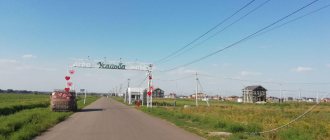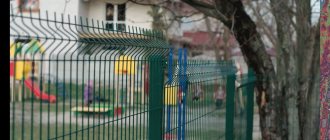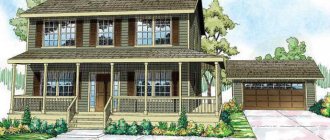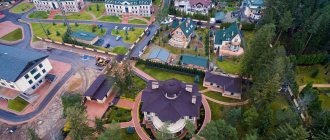What are individual housing construction, SNT and DNP
Before you start searching for a suitable plot, you need to find out what types of land plots there are. In matters of purchasing a plot of land, you should rely solely on your prudence and legal awareness, otherwise you can find yourself in a very difficult situation during its operation and development.
The documentary status of the land determines the amenities of the area, the possibility of registration, the requirements for future buildings, as well as the value of the acquisition itself (both at the time of registration of the transaction and in the case of secondary resale of the property).
First of all, you should give a decoding of incomprehensible abbreviations:
- Individual housing construction is individual housing construction;
- DNP – dacha non-profit partnership;
- SNT is a gardening non-profit partnership.
Land areas for individual housing construction, in accordance with established legislation, must be located within inhabited settlements. This means that the future owner can count on the presence of communication interchanges, developed infrastructure and other benefits. DNP and SNT lands are localized exclusively in agricultural zones, and the quality indicators (that is, soil fertility) for these types can vary significantly.
SNT - what is the purpose of this land?
This question is relevant for gardeners. They must be classified as "for general use". These include areas of agricultural land that are located outside the city limits.
The Land Code of 1991 prohibited the use of any other land for ST. It also highlighted that these lands can become the private property of the owners subject to a number of procedures.
In 1998 (and then in 2011), zoning of lands became mandatory, after which the process of their allocation can be carried out. Such lands can be allocated taking into account plans for laying power lines, roads and other important government facilities.
Legislation helps answer questions about the status of SNT land, what it is. We should not forget that these include only agricultural land, but not for personal farming. Land in the SNT must be purchased in accordance with the orientation towards the fact that it is possible to extract from it. Not a single building here will receive capital status. After construction, the house in SNT will not go beyond the scope of a country house. When purchasing land in a partnership, you should know that the cadastral and market value will differ from the plot for individual housing construction.
If the person who purchases the plot plans to erect a permanent structure in the future, he will be disappointed. The implementation of the plan is possible only if the site is designated for individual housing construction, where there is permission and regulations for this type of use.
But a house built on a summer cottage with the category of agricultural land will never receive the status of individual housing construction with subsequent registration and residence of people. However, you can also register in a country house. But for this, the building on the site must meet all standards for year-round use. A special commission is invited to resolve such issues.
This commission is authorized to issue a certificate that the buildings and land are suitable for living all year round. Such a decision is the basis for registering owners in a dacha building if there is an address for the site.
The type of SNT plot is agricultural land; it is not planned to build infrastructure on it, but it is possible to develop it to some extent (lighting, streets).
Comparative analysis
Individual housing construction - advantages, disadvantages and limitations
Individual housing construction is a plot of land that is located within a populated area. On the basis of the Town Planning Code, paragraph 3 of Art. 48 on land for this purpose it is permitted to erect residential buildings of no more than 3 floors in height. In addition, the allocated area must fall under the appropriate subdivision (industrial, commercial, residential, etc.).
On the territory of individual housing construction it is prohibited:
- engage in processing of agricultural products for commercial purposes;
- produce/sell ritual goods;
- construct objects for municipal or industrial use.
Despite all the existing restrictions, individual housing construction land is the most needed and prestigious for the construction of residential buildings, and accordingly the cost of such plots is much higher.
Let's consider the main advantages of purchasing individual housing construction plots:
- Upon completion of the construction of the building, you can easily obtain local registration, since the land plot initially has a police address. This means that you will not have problems finding a job or providing children with a place in preschool and educational institutions. You will be able to draw up various benefits, write correspondence, etc.
- Homeowners have the right to count on free connection of their house to the general sewer system, water supply, gas and electrical systems.
- Residents of individual housing construction can use all social services (enroll their children in schools/kindergartens, visit a clinic, etc.). In addition, in the development area there are necessarily transport interchanges and retail outlets, which makes living in the area more comfortable.
- It is allowed to apply for a tax deduction for this property, since the building will be classified as a residential property.
- If you wish, you can get a mortgage loan secured by the purchased plot (most large banks in such situations make a positive decision when submitting an application).
- If you have a residence permit, you are allowed to store weapons on private property.
In addition to the above restrictions, when choosing individual housing construction it is worth considering its disadvantages:
- The size of the land plot cannot be more/less than the established norms (these values vary in each region).
- Since this involves the construction of a residential facility, the development project will need to be approved by the relevant authorities, as well as thorough compliance with the regulated requirements during the construction and operation of the structure.
- Despite the requirements adopted in the law for the infrastructure of individual housing construction, in reality there are often serious inconsistencies. Therefore, such a purchase does not guarantee you the availability of communications, good roads and nearby social institutions.
Pros and cons of DNP
The DNP plot is ideal for building a country house. Typically, such land is located outside the city, but in some cases it can be located within the boundaries of settlements, which practically equates it with individual housing construction.
Let's look at the main advantages of DNP:
- low cost - the price for such land still remains the most profitable; it is almost 20% (and sometimes more) lower than in the first option;
- Basically, the site is located outside the city boundaries, so you can easily enjoy all the advantages of living outside the city;
- when purchasing a plot of this type, the buyer automatically becomes a member of the DNP partnership, which means he has the right to speak at meetings of the company, vote and protect his interests;
- there is no need to carry out a technical examination of the house and assess its condition;
- if the land is located in a settlement, it will subsequently be possible to register on it.
Disadvantages of DNP:
- When constructing a building, regardless of its amenities, area and other parameters, it cannot be registered as a residential building, this is how DNP differs from individual housing construction
- Registering there will also be extremely problematic, although this is not prohibited by law, but in practice people face various problems that significantly delay this process.
- The DNP plot has an agricultural purpose, so it is allowed to build country or garden-type houses on such land, but it will most likely be very difficult to erect a large building for permanent residence.
- There are no communications - if you decide to improve your property, install gas, water, electricity, roads, etc., you will have to carry out all the work at your own expense. This is usually very expensive (20% or more of the cost of the site itself). In addition, before you begin to implement your idea, you should obtain the appropriate permission from the authorities, as well as enlist the support of all participants in the DNP union.
- Sometimes the cost of constructing a roadway, the availability of communications and infrastructure is included in the cost of a DNP site, but in such cases this indicator is no different from the price of individual housing construction.
- It is prohibited to use the land for agricultural purposes only.
- Shops, hospitals, childcare centers and other public facilities will be located at a considerable distance. Therefore, to apply for honey. To help or place your child in kindergarten/school, you will have to constantly travel to the nearest city.
- It is problematic to obtain a mortgage secured by DNP; banks are reluctant to enter into such transactions.
Features of SNT
SNT land plots are more valuable in comparison with DNP, as they are cut into areas with a higher quality score (the level of soil fertility is higher here). They are usually located in rural areas, with good environmental conditions and picturesque landscapes around. This criterion also affects the cost of plots, so the price for them will exceed the cost of the DNP.
The advantages of SNT include such indicators as:
- lower cost compared to individual housing construction;
- sites are localized in rural areas;
- the land plot may be used only for land development and planting without development;
- Here you can build a large country house.
Disadvantages of SNT:
- the status of the land does not provide for the presence of communications connected to the property; all work must be carried out by the owner of the site at his own expense;
- it is not prohibited to register in such buildings, but it is difficult to realize these intentions, and in some situations it is not possible in principle, since such lands belong to gardening partnerships;
- It is extremely difficult to obtain a mortgage loan secured by SNT;
- an object located on a SNT site, regardless of its amenities, area, number of storeys and other parameters, will be considered a garden building, which means that when the property is sold, its estimated value will be minimal.
If you compare the DNP and SNT sections, you can notice certain similarities. It is worth noting that from the legal side there are no differences between these statuses.
What is SNT: definition of the term
SNT is an abbreviated name for a form of association of citizens created to solve current problems in the horticultural process.
Such an organization must be registered with the tax authorities. It is imperative to develop a Charter as a tool for resolving controversial situations.
The members of the association are the owners of individual plots who make voluntary contributions to the general goals of the organization.
SNT has its own land and the necessary infrastructure (roads, water supply, communications for various purposes).
How is it deciphered?
SNT literally stands for “horticultural non-profit partnership.”
In other words, this is a voluntary association of summer residents, the purpose of which is to jointly resolve issues related to the exploitation of land plots legally.
SNT members use the land in accordance with the association's charter: plant trees, grow fruits and vegetables.
The construction of a house and adjacent outbuildings is allowed. The law provides for registration at the location of the dacha, but only if the constructed structure is suitable for habitation.
Legal entity or not?
SNT is a non-profit organization. The purpose of the creation is to jointly solve the problems of proper gardening. According to the Federal Law on Dacha Associations of Citizens, such organizations are subject to mandatory state registration in the manner prescribed for legal entities.
What is the difference between SNT and ST?
Historically, the creation of SNT was preceded by another form of association of gardeners - ST. They entered into such partnerships in order to receive from the state a plot of land (no more than 8 acres) with a country house located on it. There was no other option to acquire country real estate. ST members were responsible for making contributions, and the board of the partnership collected utility bills.
The concept of “SNT” appeared in 1998 as a new form of legal entity. According to regulatory act No. 66-FZ, the previously existing STs were to be reorganized into non-profit associations.
Types of land plots
To select land for use, the owner determines his own purchase goals and requirements, whether he expects to live on the site or in another place. This affects the choice of land plot that has certain permissions to carry out activities:
- Only on the territory of agricultural lands is the DNP located - the abbreviation means dacha non-profit partnership. This is a legal form of ownership that functions as a partnership between plot owners.
- DNT refers to the second type of association of owners of dacha plots, stands for dacha non-profit partnership.
- Before deciphering the SNT, you need to decide that the owners of the formation are conducting joint gardening activities. The abbreviation stands for garden non-profit partnership.
- The designation IZHS stands for land allotment for individual housing construction; this is land for permanent houses. They are located within the urban planning.
- In order to exercise their rights to receive vegetable gardens, orchards and other plots, own them and meet their own needs, SDT are created. The decoding means garden dacha partnerships.
Dacha non-profit partnership
Created for growing food in gardens, vegetable gardens and building country houses. If DNP territories are legally located within the city, then their characteristics become similar to individual housing construction sites.
Associations of summer residents DNP have positive aspects:
- low cost of land;
- environmental attractiveness;
- the form of interaction between partners involves influencing the resolution of issues at general meetings;
- location within the boundaries of a village or city allows for the possibility of obtaining permanent registration;
- technical expertise does not take into account the size of the structure.
But these categories have disadvantages:
- it is difficult to convert a building into a capital one;
- in some cases, building a road or communications costs more than the cost of the land;
- if you first include the cost of highways in the price of the plot, then it will rapidly increase;
- a plot of land with a building cannot serve as collateral when applying for a mortgage;
- To regularly maintain a garden and vegetable garden, you need to build a residential building, since the site is located outside the city and frequent trips are unacceptable.
Dacha non-profit partnership
By law, the lands are used for growing vegetables and fruits, recreation, and building small houses. The latter is not necessary, since you can use the plots without joining a partnership (running an individual business). At the same time, the owner of the plot has the right to use common areas, which are used for access roads and other infrastructure.
Payment for the operation of general communications, roads and other facilities is made on the basis of a written agreement between the owner and the board. The amount of regular payments should not exceed the amount of accepted membership fees in the partnership. The owner of the plot can independently make a decision on the issue of participation in changes and reconstructions of various infrastructure facilities.
All problems are resolved at the general meeting; minutes must be drawn up, without which the actions of the members of the board or the chairman are unauthorized and have no legal force.
Garden non-profit partnership
The cultivation of agricultural crops and the construction of outbuildings for the preservation and processing of products are permitted. Temporary residential buildings are being repaired. The main document is the charter, which reflects general information about the partnership. The goals of creation are introduced, the rights and responsibilities of SNT as a legal entity are prescribed.
The text lists the property, indicates the conditions for entry, the form of control over the activities of the partnership, the ways of forming the funds of the fund, provides for the liability of the partnership in terms of debts, considers the procedure for office work and the sequence of actions during liquidation. All members of the partnership pay membership fees, but the procedure for collecting them is left to the discretion of the accounting department. Upon joining, a one-time entrance fee is also paid.
The formation of SNT as a form of activity on the site has advantages:
- the cost is much lower than that of capital plots of individual housing construction;
- It is allowed to grow agricultural products without erecting any type of residential building.
The disadvantages include the following provisions:
- payment for communications comes from the pockets of land owners;
- due to its location outside the boundaries of a village or city, it is difficult to obtain a residential building and permanent registration;
- cannot be used as collateral when applying for a loan;
- any building on the site is considered as a dacha building and, when sold, does not significantly increase the value of the plot, even if a full-fledged residential building is erected there.
Individual housing construction sites
These include plots within the city, purchased by citizens for the construction of permanent houses. They are assigned to a postal address; residents obtain permanent registration and have the right to register other people. These land plots are almost always served by city communications. Owners pay only for the connection to their home, if such highways are just being laid.
Plots of this category are registered in the register of the Russian Land Chamber; banks consider them as collateral when issuing mortgages and other types of loans. The cost of a plot of land together with built houses is sometimes very high and depends on the location, size and type of building, area of the site, the presence of outbuildings, and building materials.
Disadvantages of such areas:
- the area of land is initially limited;
- before construction, an expensive project must be drawn up, and after construction is completed, commissioning must be done;
- high cost of plots due to location within the city.
Garden dacha partnerships
These formations are not considered public not so much because of the satisfaction of the material needs of individual participants, but because of the lack of a common goal in ownership. Each owner has his own plot on which he conducts independent gardening or vegetable gardening activities or rests and lives temporarily, without registration.
If the owner joins a garden dacha partnership, then common property is formed by making targeted payments. The property can be used in the interests of the participants, but is the property of the formation as a legal entity; a decision on this is made at the general meeting and documented in minutes.
When leaving the partnership, the owner loses the right to dispose of part of the common property and his financial situation changes.
Advantages and disadvantages of SNT
When studying the question of what it is - SNT, deciphering the concept, it is possible to consider the following points.
Advantages of gardening partnerships:
- presence of security;
- clean and well-groomed area;
- availability of access roads;
- quietly doing what you love on the site;
- the opportunity to build a house and live in it;
- low cost of land;
- there is no need to create a project;
- beautiful place;
- low tax rate.
Disadvantages of a garden partnership:
- the location may be remote;
- unnecessary additional contributions;
- not everywhere there is good infrastructure;
- problems with registration of rights and registration;
- impossibility of obtaining a mortgage on the plot.
What do you need to know about organizing the activities of SNT?
The highest governing body of the gardening partnership is the general meeting of all its members, which is held annually. Together they have the right to establish the competence of such meetings, the powers of the chairman of the SNT, the procedure for holding them - in person or in absentia, establish a quorum for decision-making, reasons for convening an extraordinary meeting. Each meeting has an agenda, that is, a range of issues that need to be discussed and resolved. There are authorized persons for drawing up protocols, for counting votes, etc.
The SNT chairman is in charge, he has a range of responsibilities and powers that he cannot violate or exceed. In most cases, he acts free of charge, he is chosen from ordinary areas, by his agreement to take on this burden of responsibility. The general meeting of members of the partnership may still decide to provide the chairman with some remuneration, although it is rarely significant. At the request of the meeting, he provides reports on the work done, the expenditure of funds, and the resolution of all other issues. All other participants turn to him for help, and he is obliged to provide it, otherwise he may be re-elected at the first regular meeting.
How to choose a site for SNT
Location is one of the most important parameters . It is better to abandon popular destinations, otherwise you will have to stand in traffic jams for a long time when traveling to the country. It’s worth checking whether you can get to your country house by train or bus?
If the plot is of a non-standard shape, this may complicate the construction of a house on it. According to the law, the distance from the edge from the site to the house must be at least 1-5 meters.
If the house is on a slope, you run the risk of being flooded in the spring every year. The proximity of railroad tracks, power lines, landfills, and dirty ponds spoils the impression of outdoor recreation.
It is necessary to clarify whether highways, an industrial enterprise or an airport, as well as other objects unfavorable for the environment, are going to be located nearby.
The services of a professional appraiser will not be superfluous . He will promptly point out the shortcomings of the house, conduct an examination of communication networks, name the fair value of the site and protect you from overpayment.
Conclusion
Explanation SNT - gardening non-profit partnership. This is an association that a citizen who owns a plot in the area suitable for farming can join.
The community has the status of an official legal entity and is created to ensure order and proper maintenance of the common territory.
What are the consequences of leaving SNT? Consequences:
- any payment of contributions ceases;
- the person who leaves cannot participate in the internal affairs of the partnership;
- no longer subject to the Charter;
- the participant who leaves is not elected to the management.
In fact, nothing serious threatens. You can leave the partnership at any time; there are no restrictions on this .
Pros and cons of two types of OPF
Homeowners' associations or TSN can unite not only owners of apartments in apartment buildings, but also owners of country or garden-type plots, garages, and areas intended for vegetable gardens. Property can be anything, but the form of organization remains unchanged. Members of the TSN management may not consult with members of general meetings and independently resolve important issues.
TSN also has significant disadvantages, for example, such an organization cannot be transferred to a simplified tax payment system, unlike HOAs. The main advantage of TSN is that its participants are not liable for the obligations of the partnership with their property and, if desired, can change its form by creating a consumer-type cooperative. SNT and TSN differ in the rules for conducting business, in addition, each of these OPFs has its own nuances.
It should be taken into account that changes in the law did not significantly affect partnerships created before September 1, 2014. At the same time, changes to the list of existing documents and the charter must be carried out taking into account accepted standards. The name of new legal entities is no longer indicated in the form of an abbreviation; it must have a different form: “association of real estate owners.”
Legal status of SNT
Non-profit gardening partnerships are legal entities whose purpose is not to make a profit.
They are formed to achieve other goals - mainly to assist citizens in exercising their rights to own land, extracting some benefit from it, and obtaining results in the form of agricultural and fruit and vegetable products. So that the common areas of garden plots are landscaped, so that it is possible to pay for housing and communal services received on the territory of SNT in an organized manner, so that such activities are streamlined - this is why the formation of SNT is required.
For the needs of SNT, land can be allocated only for a specific purpose, usually general. The lands of special funds allocated for the organization of SNT can become the personal property of citizens who are members of the relevant associations.
Like any legal entity, SNT has a set of rights and obligations. Among the rights, we note the opportunity to represent and protect the interests of all its participants. Responsibilities include timely submission of the types of reports established by law, reporting on changes in their management bodies, etc.
A gardening non-profit partnership is an organization that operates on the basis of the Charter. Therefore, when developing and approving it, it is necessary to pay sufficient attention to such issues as the election of the chairman, decision-making, the frequency and procedure for holding meetings, the procedure for notifying them, liability for non-payment of contributions and many others. It is important that the Charter does not contradict current laws.
Gardening is also a subject that has the right to enter into contracts on its own behalf and make payments on them. Usually they relate to obtaining certain resources or services - water supply, electricity, waste removal. Funds for payment are collected from all participants in the form of membership and entrance fees, as in the USSR. But money can also be allocated to this organization from budgets and from the services provided. How to manage monetary assets is also discussed at meetings.
There is also such an organizational and legal form as SNP - this is a garden non-profit partnership. There are legal differences between them, but we are more concerned about what SNT is.
What problems may the owner of a land plot in SNT encounter?
As already noted, SNTs are not always provided with the resources necessary for a comfortable life. If electricity and water supply are usually present, then in most cases one can only dream of a gas pipeline and centralized sewage system. However, it is quite possible to do without these benefits of civilization - electric stoves and local treatment facilities, as well as septic tanks, have long been invented.
The legal registration of a house in practice raises questions: it is not regarded as a capital construction project.
To make permanent year-round living possible and comfortable, you must have your own car and choose SNT, which is located very close to a large city, has a good paved road and everything you need is at hand: shops, educational institutions, medical institutions, service facilities, etc. The organization of security and entry into the territory of the partnership is also important.
Taking into account all these factors, it is quite possible to move to a permanent place of residence in a gardening non-profit partnership!






